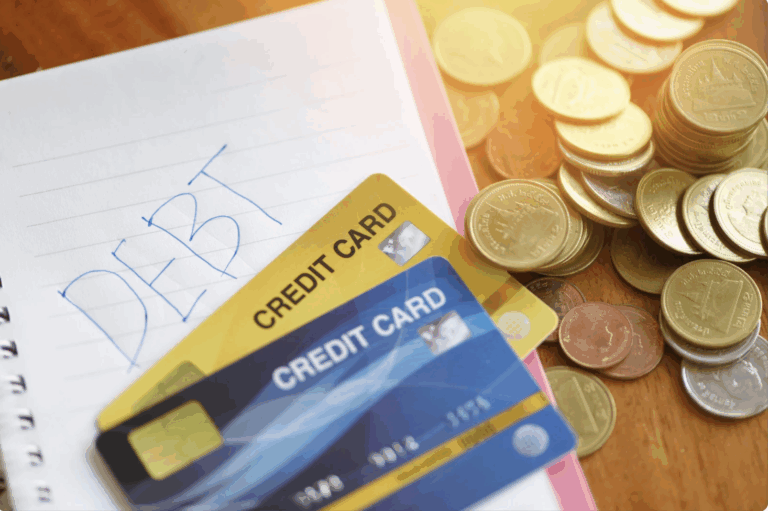Can a credit card company sue you? Unfortunately, the answer is yes.
Credit cards can be an essential financial tool for many people, allowing them to cover expenses, build credit, and earn rewards. However, credit card debt can also become a significant financial burden if you don’t keep it under control. If things get out of hand, you could even be sued by your credit card company over unpaid debt.
Alarmingly, people are relying on credit cards more than ever to get by. According to data from the Federal Reserve Bank of New York, Americans owed a record total of $986 billion in credit card debt at the end of 2022. That’s a 15.2% increase from the previous year.
So if you’re struggling with credit card debt or even collections that can turn into a lawsuit in civil court, read on to learn what it means and what to do next.
Understanding Credit Card Agreements
When you open a credit card account, you enter into a contractual agreement with the credit card company. The agreement outlines the terms and conditions of the credit card, including the interest rate, credit limit, and payment requirements. It also specifies your obligations as the cardholder, such as paying the minimum payment on time and not exceeding the credit limit.
Keep in mind that you’re responsible for reading and understanding the agreement. And it becomes a legally binding contract once you sign up for the card.
Reasons Credit Card Companies Might Sue
According to a 2021 report by the Consumer Financial Protection Bureau (CFPB), the odds of being sued by a credit card company is 14.5%. Additionally, the average litigated account balances ranged from $2,700 to $12,300.
Credit card companies may sue cardholders for various reasons, including delinquent payments, fraud, and other agreement violations.
Often, failing to make credit card payments is what results in a lawsuit. If the account becomes severely delinquent, the credit card company may charge off the debt and send it to an internal collection department or sell it to a third-party debt collection agency. This usually happens when your account has been delinquent for at least 180 days and is in default. If the debt collector is unsuccessful at getting you to pay up, the next step is often suing you.
Credit card fraud is another reason you could face legal action from your creditor. Fraudulent charges can occur when someone steals your card information and makes unauthorized purchases. If you promptly report this fraud to the credit card company, you won’t be responsible for the charges. However, if the problem goes undetected or unreported, you may be liable for the charges and any associated fees.
Finally, credit card companies may sue you for agreement violations, such as exceeding the credit limit or using the card for unauthorized purposes. These violations are typically outlined in the credit card agreement.
Legal Process of a Debt Collection Lawsuit
The legal process will begin if a credit card company does sue you. In general, these are the steps that occur next:
- Notification. First, you will be served with a copy of the lawsuit and a court summons, which will provide information about the lawsuit and the date and time of the court hearing.
- Response. It’s crucial that you respond to the lawsuit by filing a written answer with the court before the deadline. Typically, you have 20-30 days from being served to answer. If you fail to respond, the court may enter a default judgment in favor of the credit card company.
- Discovery. Both parties may engage in discovery, a process where they exchange information about the case. This may include requests for documents, written questions, and depositions.
- Settlement negotiations. You might attempt to negotiate a settlement to avoid going to trial. A settlement may involve a payment plan on the full balance, or a lump sum payment for a reduced amount, to resolve the debt.
- Trial. If the case goes to trial, both parties will present their evidence and arguments before a judge. They will then make a decision and enter a judgment.
- Enforcement. If the credit card company wins the case and obtains a judgment against you, they may use more aggressive legal means to collect the debt. This may include wage garnishment, bank account levies, and property liens.
Defenses Against Credit Card Lawsuits
Just because a credit card company sues you doesn’t mean you’re at fault. Or the lawsuit may not be fully accurate. That’s why it’s important to work with an experienced debt relief lawyer who can help you craft an appropriate response and defense to the lawsuit. Some examples of potential defenses include:
- Lack of standing. If the credit card company can’t prove it’s the rightful owner of the debt, it may lack legal standing to sue.
- Statute of limitations. Each state has a statute of limitations for bringing a lawsuit to collect a debt. If the credit card company files a lawsuit after the statute of limitations has expired on a time-barred debt (often three to six years), you can raise this defense.
- FDCPA violations. The Fair Debt Collection Practices Act (FDCPA) prohibits debt collectors from engaging in certain practices. Those include making false or misleading statements, harassing the debtor, making phone calls during off hours, or using abusive language. If the credit card company violated the FDCPA, you could have a counterclaim against the collection agency.
- Improper service. You might have a defense if the credit card company didn’t follow the proper legal procedures for serving the lawsuit.
Again, hiring an experienced attorney is important for learning your rights and navigating the legal process correctly.
Your attorney may negotiate a debt settlement to help you avoid going to court and stoping the lawsuit. This may help you to reduce costs and time. Alternatively, if you decide to file either a Chapter 7 or Chapter 13 bankruptcy, it could result in an automatic stay of the lawsuit and collection process.
How a Debt Lawsuit Impacts Your Credit and Finances
Facing a debt lawsuit is not only stressful but can have a significant impact on your finances.
For one, a history of missed payments and collections accounts leading up to a lawsuit will wreak havoc on your credit score. This can make it difficult to borrow money in the future and secure an apartment, new utility accounts, certain jobs, and more. Missed payments stay on your credit report for seven years, though the impact on your score lessens over time.
Losing the lawsuit may result in a wage garnishment by the credit card company. This means that a portion of your paycheck will be withheld and sent to the credit card company to pay off the debt. They may even be able to take money directly out of your bank account (known as a levy), making it even more difficult to cover expenses.
Another potential consequence of losing a debt lawsuit is having a lien placed on your property. This means the credit card company can claim a portion of the proceeds if the property is sold. Not only would this result in getting less money in the event you sell your house, but it can also make it more difficult to sell in the first place or refinance your mortgage.
Fees can be added onto judgment amounts and liens and can add up quickly, making it even more difficult to manage your debt and other financial responsibilities.
How to Prevent a Lawsuit Over Credit Card Debt
No one wants to be sued by their credit card company. So it’s crucial that you uphold your end of the credit card agreement and take action if you experience financial hardship. Some steps you can take to avoid a lawsuit include:
- Make payments on time: One of the main reasons credit card companies sue their customers is for delinquent payments. So to prevent a lawsuit, making payments on time and in full is important.
- Communicate with your credit card company: If you’re having difficulty making payments, communicate with your credit card company as soon as possible. They may work with you to create an alternative payment plan or temporarily modify the terms of your agreement so you can get back on track.
- Seek help: If you are struggling with debt, consider seeking the help of an experienced debt relief attorney who specializes in resolving credit card debt regularly to advise you on your rights and what to expect.
- Keep an eye on your accounts:
Monitor your credit card accounts and credit reports regularly to check for any errors or unauthorized charges. Report issues to your credit card company and credit bureau (Experian, TransUnion, Equifax) promptly. - Negotiate a settlement: Consider a debt-help attorney to settle your debt if you can’t resolve it promptly. Some companies would rather receive a reduced payment than nothing. They may agree to a deal if it’s clear you can’t pay back the full amount.
- Consider bankruptcy: If you are overwhelmed with debt and cannot repay your bills, consider filing for bankruptcy. Though it’s a last-resort option, bankruptcy can provide a fresh start and help you avoid a credit card lawsuit.
Get Help With Credit Card Debt ASAP
Letting your credit card debt spiral to the point of a lawsuit spells big trouble for your finances. You should do everything possible to prevent things from getting to that point. And if necessary, you should employ the help of a professional credit counselor or debt relief law firm.
Tayne Law Group, P.C. is a trusted source of legal advice and debt solutions. Contact us today for a free, no-obligation phone consultation to learn more about our services and how we can help with your credit card debt. Call us toll-free at (866) 890-7337 or fill out our short contact form. We never share or sell your information, and all conversations are confidential.





